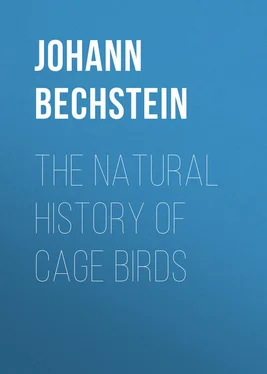Johann Bechstein - The Natural History of Cage Birds
Здесь есть возможность читать онлайн «Johann Bechstein - The Natural History of Cage Birds» — ознакомительный отрывок электронной книги совершенно бесплатно, а после прочтения отрывка купить полную версию. В некоторых случаях можно слушать аудио, скачать через торрент в формате fb2 и присутствует краткое содержание. ISBN: , Жанр: foreign_antique, foreign_prose, на английском языке. Описание произведения, (предисловие) а так же отзывы посетителей доступны на портале библиотеки ЛибКат.
- Название:The Natural History of Cage Birds
- Автор:
- Жанр:
- Год:неизвестен
- ISBN:http://www.gutenberg.org/ebooks/40055
- Рейтинг книги:4 / 5. Голосов: 1
-
Избранное:Добавить в избранное
- Отзывы:
-
Ваша оценка:
- 80
- 1
- 2
- 3
- 4
- 5
The Natural History of Cage Birds: краткое содержание, описание и аннотация
Предлагаем к чтению аннотацию, описание, краткое содержание или предисловие (зависит от того, что написал сам автор книги «The Natural History of Cage Birds»). Если вы не нашли необходимую информацию о книге — напишите в комментариях, мы постараемся отыскать её.
The Natural History of Cage Birds — читать онлайн ознакомительный отрывок
Ниже представлен текст книги, разбитый по страницам. Система сохранения места последней прочитанной страницы, позволяет с удобством читать онлайн бесплатно книгу «The Natural History of Cage Birds», без необходимости каждый раз заново искать на чём Вы остановились. Поставьте закладку, и сможете в любой момент перейти на страницу, на которой закончили чтение.
Интервал:
Закладка:
Experience teaches me that a mixture of crushed canary, hemp, and rape-seed, is the favourite food of canaries; goldfinches and siskins prefer poppy-seed, and sometimes a little crushed hemp-seed; linnets and bullfinches like the rape-seed alone. It is better to soak it for the young chaffinches, bullfinches, and others; in order to do this, as much rape-seed as is wanted should be put into a jar, covered with water, and placed in a moderate heat, in winter near the fire, in summer in the sun. If this is done in the morning, after feeding the birds, the soaked seed will do for the next morning. All of them ought to have green food besides, as chickweed, cabbage leaves, lettuce, endive, and water-cresses. Sand should be put in the bottom of the cages, for it seems necessary for digestion 7 7 See Rennie’s “Faculties of Birds,” Chap. V., for experiments on the subject. – Translator.
.
Amongst those of the second class, the quails like cheese and the crumbs of bread; the lark barley-meal, with cabbage, chopped cress, poppy-seed mixed with bread crumbs, and in winter, oats; the chaffinches, rape-seed, and sometimes in summer a little crushed hemp-seed. Too much hemp-seed, however, is hurtful to birds, and should only be given as a delicacy now and then, for when they eat too much of it they become asthmatic, blind, and generally die of consumption. Yellowhammers like the same food as the larks, without the vegetables; the tits like hemp-seed, pine-seed, bacon, meat, suet, bread, walnuts, almonds, and filberts.
The birds of the first class are easily preserved in the house, at least if not taken during the pairing season, for then the loss of their liberty affects them so much that they become sullen, and die of hunger.
Although the notice of a universal remedy is generally rather suspected, I cannot refrain from here recommending one or two sorts of paste which I have always used, and which agreed so well with all my birds, excepting those which I keep in cages on account of their beautiful songs, that it may justly be termed general or universal food: it is not only very simple and cheap, but also prevents great loss of time to those who possess a great many birds.
The universal paste. – To make the first paste, take a white loaf which is well baked and stale, put it into fresh water, and leave it there until quite soaked through, then squeeze out the water and pour boiled milk over the loaf 8 8 The reason of this union of vegetable and animal food may be easily seen; the bread supplies the seed for the birds of the first class, and the milk the insects for those of the second, while the third and fourth here find their mixed food; and thus it ought to agree with all. Besides, the birds of the first class do not confine themselves exclusively to seeds; in their wild state they eat many insects, and some even feed their young entirely with them; this proves that animal food is sometimes useful and beneficial to them. – Translator.
, adding about two thirds of barley-meal with the bran well sifted out, or, what is still better, wheat-meal; but, as this is dearer, it may be done without.
For the second paste, grate a carrot very nicely (this root may be kept a whole year if buried in sand), then soak a small white loaf in fresh water, press the water out, and put it and the grated carrot into an earthen pan, add two handfuls of barley or wheat meal, and mix the whole well together with a pestle.
These pastes should be made fresh every morning, as they soon become sour, particularly the first, and consequently hurtful. For this purpose I have a feeding-trough, round which there is room enough for half my birds. It is better to have it made of earthenware, stone, or delft ware, rather than wood, as being more easily cleaned, and not so likely to cause the food to become sour.
The first paste agrees so well with all my birds, which are not more than thirty or forty, at liberty in the room, that they are always healthy, and preserve their feathers, so that they have no appearance of being prisoners. Those which live only on seeds, or only on insects, eat this food with equal avidity; and chaffinches, linnets, goldfinches, siskins, canaries, fauvettes, red-breasts, all species of larks, quails, yellowhammers, buntings, blue-breasts, and redstarts may be seen eating out of the same dish.
Sometimes, as a delicacy, they may be given a little hemp, poppy, and rape-seed, crumbs of bread, and ants’ eggs. One of these is necessary for the birds of the third and fourth class.
Every morning fresh water must be given to the birds, both for drinking and bathing. When a great many are left at liberty, one dish will do for them all, about eight inches long and two in depth and width, divided into several partitions, by which means they are prevented from plunging entirely into the water, and in consequence making the place always dirty and damp 9 9 If a rather large, flat, and not very deep vessel be used, in which the birds can bathe at their ease, it will make them more healthy and clean. – Translator.
. A vessel of the same size and shape will do for holding the universal paste, but then it must have no partitions. Quails and larks require sand, which does for them instead of water for bathing.
Some birds swallow directly whatever is thrown to them: great care must be taken to avoid giving them anything with pepper on it, or bad meat. This must be a general rule. I shall also remark, that food sufficient for one day only must be given to birds kept in cages, for they are accustomed to scatter it about, picking out the best, and leaving only the worst for the next morning; this makes them pine, and puts, them out of humour.
Mr. Sweet’s food for soft-billed birds (sylviadæ). – The birds of this sort, though the finest songsters and most interesting of all the feathered tribe, have been less known or noticed than others, probably owing to the greater number only visiting us in summer, when the trees are so densely clothed with foliage that birds are not easily seen, and when heard sing are generally considered by those who hear them to be either blackbirds or thrushes, or some of the more common singing birds. When they are seen the greater number of them receive the general appellation of white-throat, without distinction, though this is rather singular, since they are all very distinct when examined, and their songs are all very different. If you speak to a bird-fancier or bird-catcher about any of them, you might as well talk of a bird in the wilds of America, for they know nothing of them. Many of them are therefore difficult to be procured in the neighbourhood of London, though most of them are plentiful there.
With care, the whole of them may be preserved in good health through the year, and many of them will sing through the greater part of the winter if properly managed. They require to be kept warm; the room in which they are should never be allowed to be below temperate, or they will suffer from it, particularly the tender sorts; at first the cold will make them lose their sight, after which they seldom recover. The redstart and nightingale are most subject to this; it sometimes also happens to the fauvette, and also to the whinchat.
When in a wild state, the birds of this sort feed principally on insects or fruit, and berries of various kinds. None of them are seed birds, so that they must be managed accordingly. The general food which I give them is hemp-seed, bruised up in boiling water, as small as it can be made; I then put to this about the same quantity, or rather more of bread, on which is also poured boiling water, and then the whole is bruised up together into a moist paste, particular care being required that there be very little or no salt in the bread; for should there be rather much it will kill the whole of the birds. The food should also be mixed up fresh every morning, as it soon spoils and turns sour, in which case the birds will not touch it, and sometimes it will make them go off their food altogether. When given to the birds, some fresh, raw, lean meat ought to be cut up small enough for them to swallow, and mixed with it I generally put about the same quantity of meat as paste, and sometimes they will peck out the meat and leave the paste; at other times they will eat the paste and leave the meat; but in general they eat it all up together, particularly where several different species are kept together in the same large cage, a plan which I consider by far the best, as they amuse each other, and keep one another warm in cold weather. Besides the above food, an egg should be boiled very hard, the yolk taken out and crumbled or cut in small pieces for them; the white they will not eat. One egg I consider enough for twenty birds for one day, with their other food, it being only intended as a change of diet, which they will not continue well in health without.
Читать дальшеИнтервал:
Закладка:
Похожие книги на «The Natural History of Cage Birds»
Представляем Вашему вниманию похожие книги на «The Natural History of Cage Birds» списком для выбора. Мы отобрали схожую по названию и смыслу литературу в надежде предоставить читателям больше вариантов отыскать новые, интересные, ещё непрочитанные произведения.
Обсуждение, отзывы о книге «The Natural History of Cage Birds» и просто собственные мнения читателей. Оставьте ваши комментарии, напишите, что Вы думаете о произведении, его смысле или главных героях. Укажите что конкретно понравилось, а что нет, и почему Вы так считаете.












